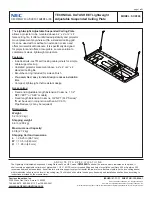
Electrical connection
Condumax CLS15D/16D/21D
20
Hauser
5.2
Connecting the sensor
The electrical connection simulator to the transmitter is established using measuring cable
CYK10.
GN/YE
YE
GN
BN
WH
GND
+
–
Com A
Com B
GY
A0024019
10
Measuring cable CYK10
NOTICE
Mechanical twist protection for CLS15D and CLS21D
If too much force is applied to the Memosens head, this can shear the connections and
therefore destroy the sensor!
‣
There is no need to exert excessive force when connecting the sensor to the cable coupling.
Proceed with care!
‣
If the Memosens coupling clearly will not close, check the coupling for dirt or mechanical
damage, and make sure that you are turning it in the right direction. Pay attention to the
lock symbol on the coupling!
‣
If necessary, use a different Memosens cable.
5.3
Ensuring the degree of protection
Only the mechanical and electrical connections which are described in these instructions and
which are necessary for the required, designated use, may be carried out on the device
delivered.
‣
Exercise care when carrying out the work.
Otherwise, the individual types of protection (Ingress Protection (IP), electrical safety, EMC
interference immunity) agreed for this product can no longer be guaranteed due, for example
to covers being left off or cable (ends) that are loose or insufficiently secured.
5.4
Post-connection check
Device condition and specifications
Action
Are the sensor, assembly, or cables free from damage on the
outside?
‣
Perform a visual inspection.
Electrical connection
Action
Are the mounted cables strain-relieved and not twisted?
‣
Untwist the cables.
Is a sufficient length of the cable cores stripped, and are the
cores positioned in the terminal correctly?
‣
Pull gently to check they are seated correctly.
Are all the screw terminals properly tightened?
‣
Tighten the screw terminals.













































